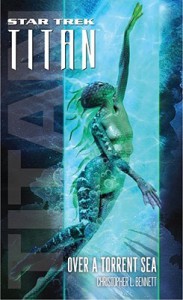Currently reading
My first Titan novel!

I had to think long and hard, in both waking and dreaming hours, about whether to rate this book three stars or three and a half. On the one hand, while I like some good hard sci-fi, the science talk in this book sometimes got overwhelming; and that just sucks the ballast out of what could have been more engaging discussions. The book doesn't sink too low under the weight of science, though, because scientific curiosity is one of the main themes of the book. In fact, it appears to be the main focus of the whole Titan series. What keeps the "info dumps" bearable is that you know they'll be relevant at some point... or at least most of them will be relevant (one hopes).
The U.S.S. Titan is Will Riker's ship after the events of Star Trek: Nemesis. I skipped the first few in the series because I jumped back into ST novels with the Destiny trilogy (which chronicles the Borg invasion to end all Borg invasions). So, I don't know the characters well, except for the captain (Riker!), the counselor (Troi, now his wife!), and the head of security (Tuvok!!), also Melora Pazlar (the low-gravity lady from that episode of Deep Space Nine, one of my all-time favorite guest characters). I think the biggest hindrance to my enjoyment of this volume was that I didn't know the characters as well as a seasoned Titan reader would. Still, Bennett kept them relatable enough. I say "job well done" especially to his rendition of Commander Christine Vale, acting captain when both Riker and Troi are off on various missions. She's a rookie at command, and Bennett strikes the perfect balance between self-doubt and determination.
Titan gets a repair and an upgrade and goes out exploring strange new worlds again. The world it finds in Under a Torrent Sea is quite strange, and there is a lot of science-talk among the officers about just how strange it is -- an ocean world, with hot ice surrounding the core, no land whatsoever, a bunch of asteroids nearby with heavy minerals, and none of it quite adding up according to the laws of physics. It's evident that the author (Christopher L. Bennett) has done his research, seeing that he cites a bunch of science journal articles on the Acknowledgement pages (yes, the acknowledgements take up two full pages). That's pretty cool, and I like more-or-less rigorous science backing up hard sci-fi novels; that also usually jives well with Star Trek (where one sees less of hokey religions and ancient weapons...). This ocean planet also has a very interesting aquatic civilization, way cooler and more out-there than, say, the Gungans (who have cool special effects but aren't really that alien).
So, the setting is good. The plot, however, advances only in fits and starts. As I said above, the science-talk adds a good deal of unnecessary bulk. Some of the inner dialogue and psycho-analysis contributes to the problem as well. This seems to be an endemic problem for Star Trek novels. Does anyone know if this is specifically a Trek problem, or is it a problem with media tie-in novels in general? I'd like to know... Anyway, the science-problem isn't as bad as it could have been because most of it is relevant to the plot. The inner-dialogue problem also could have been worse because, again, it's mostly relevant to the plot. Running alongside the theme of scientific exploration as one of the highest pursuits of civilization (a central theme to Star Trek as a whole), there is also the theme of recovering from loss. Destiny dealt a huge blow to the Federation, with the loss of several worlds and almost all of the main characters having lost a loved one during the Borg invasion. The novel begins on a sad note with all these characters dwelling on their losses (especially Tuvok). But by the end of the story, our heroes have come to an understanding with their grief because of the connections they have forged with each other. More impressively, they discover as a result of their exploration that, with so much wonder and mystery in the universe, there is no reason to dwell on one's losses.
Ultimately, the novel does come together, with the integration of the themes and the plot. It should have been about 50 pages shorter and could have been a sharper read with some trimming, but it's still not a bad entry in the Star Trek literary canon.
NEXT READ
I'll dip into my medieval English literature anthology book for a bit. Next up is a medieval re-telling of the ancient mythological story of Philomena and Tereus... should be pretty gruesome!
 3
3



